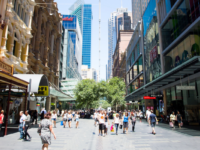Retail spending grew 2.3 per cent year-on-year in June as consumers spent more than $35.1 billion in stores and online, according to data from the Australian Bureau of Statistics (ABS).
The most “significant” sales increase was in cafes, restaurants and takeaway services at 8.6 per cent followed by food spending up 5.8 per cent.
However, all remaining categories registered a decline in spending when compared to last year.
Household goods registered the biggest decline of 4.4 per cent followed by department stores, down 2.1 per cent, clothing, footwear and accessories down 1.5 per cent, and ‘other retailing’ at 1.1 per cent.
Australian Retailers Association CEO Paul Zahra said sales growth for essentials like food “masked an overall decline” in retail spending.
“Food makes up more than a third of retail spending and its performance is being inflated by unavoidable price increases,” Zahra said. “Despite overall sales growth, the reality is that we’re very much in the grip of a discretionary spending slowdown.”
Zahra said it has become a “precarious environment” for retailers as they simultaneously feel the pinch of the spending slowdown and are left at the mercy of rising operating costs across the board.
“Shoppers have become far more spending-conscious due to the rising cost of living, and we’re seeing that reflected in these results,” Zahra added.
By state, ACT led growth by 6.2 per cent followed by South Australia at 5.4 per cent, WA at 5.4 per cent, NT at 4.5 per cent, Tasmania at 1.7 per cent, NSW at 1.5 per cent and Queensland at 0.1 per cent.
Ben Dorber, ABS head of retail statistics, said retail turnover fell due to “weaker than usual spending” on end-of-financial-year sales.
“There was extra discounting and promotional activity in May, leading up to mid-year sales events. This delivered a boost in turnover for retailers, but that proved to be temporary as consumers pulled back on spending in June,” Dorber said.”
National Retail Association CEO Greg Griffith said the “lack of impact” from mid-year year sales shows how far consumer confidence has fallen.
“Consumers are only opening their wallets for non-discretionary spending, if not for special occasions,” Griffith said.
He advised other retailers to adopt sales tactics like the big retailers who have found consumer loyalty with their own branded products to ride out the economic storm.
This story first appeared on our sister publication Inside Retail
















